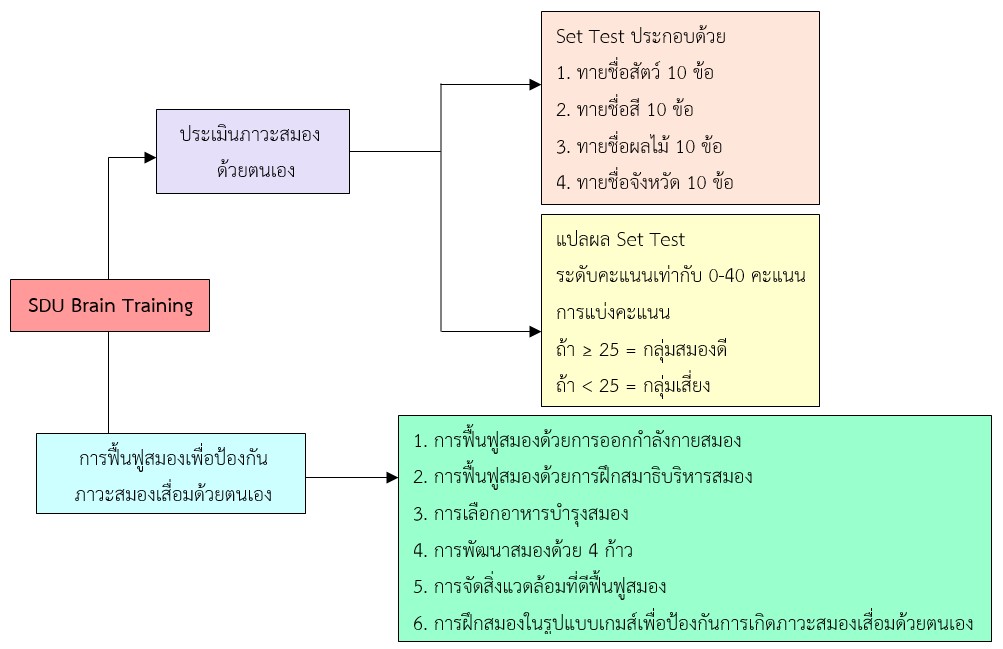The effectiveness of developing a mobile application for the self-assessment and prevention of dementia in at-risk elderly individuals
Keywords:
Mobile, Application, Dementia, Older AdultsAbstract
The objectives of this research and innovation development were to develop and examine the effects of a mobile application for self-assessment and prevention of dementia in at-risk elderly individuals in Bang Len Subdistrict, Song Phi Nong District, Suphan Buri Province. Participants included 35 elderly individuals at risk of developing dementia. The research instrument was a mobile application for dementia prevention. Data collection tools included an effectiveness assessment form and a satisfaction assessment form for the mobile application. The data were analyzed using descriptive statistics, including mean and standard deviation.
The results showed that the mobile application for dementia prevention, which consisted of two parts: self-assessment of cognitive function and self-rehabilitation to prevent dementia, including brain exercises, concentration training, brain-boosting diets, brain development based on the 4-step principle, creating a good environment, and brain training games, showed high effectiveness. The overall effectiveness of the mobile application in terms of feasibility, accuracy, appropriateness, and utility had the highest average score (Mean = 4.75, S.D. = 0.30). The overall satisfaction level with the application was also at the highest level (Mean = 4.85, S.D. = 0.36). This shows that this mobile application for dementia prevention is highly effective. Therefore, healthcare professionals or caregivers can efficiently use this mobile application for dementia prevention to promote self-rehabilitation and dementia prevention among the elderly.
References
ชัชวาล วงค์สารี. (2560). ผลกระทบการเกิดภาวะสมองเสื่อมต่อผู้สูงอายุในประเทศไทย. วารสารมหาวิทยาลัย คริสเตียน, 23(4), 680-689.
ปราโมทย์ ประสาทกุล และคณะ. (2565). สถานการณ์ผู้สูงอายุไทย พ.ศ. 2564. นครปฐม: มหาวิทยาลัยมหิดล.
วันเฉลิม พรหมศร, บุญชู บุญลิขิตศิริ และปรัชญา แก้วแก่น. (2563). การออกแบบแอปพลิเคชันเกมส์ออกกำลังกายสำหรับผู้สูงอายุในประเทศไทยใช้ป้องกันภาวะสมองเสื่อมชนิดอัลไซเมอร์. วารสารสารสนเทศศาสตร์, 38(4), 21-41.
ศุภานัน เหลาคำ และวารณี บุญช่วยเหลือ. (2565). ปัจจัยที่มีผลต่อความรอบรู้ด้านสุขภาพและความรู้เกี่ยวกับภาวะสมองเสื่อมของผู้สูงอายุในจังหวัดสมุทรสงคราม. วิทยานิพนธ์เภสัชศาสตรมหาบัณฑิต สาขาวิชาเภสัชศาสตร์สังคมและการบริหาร บัณฑิตวิทยาลัย มหาวิทยาลัยศิลปากร.
สำนักงานสถิติแห่งชาติ. (2560). รายงานการสำรวจประชากรผู้สูงอายุในประเทศไทย 2559. สืบค้นเมื่อ 10 กรกฎาคม 2565 จาก https://www.nso.go.th/nsoweb/nso/survey_detail/cj.
สุมิตรา โพธิ์ปาน และปัทมา สุพรรณกุล. (2562). การดูแลสุขภาพของผู้สูงอายุด้วยเทคโนโลยีดิจิทัล. พุทธชินราชเวชสาร, 36(1), 128-136.
อาทิตยา สุวรรณ์ และสุทธิศรี ตระกูลสิทธิโชค. (2559). ความชุกของภาวะสมองเสื่อมและปัจจัยที่สัมพันธ์กับ ภาวะสมองเสื่อมในผู้สูงอายุ ตำบลหลักหก อำเภอเมือง จังหวัดปทุมธานี. วารสารวิชาการสมาคมสถาบันอุดมศึกษาเอกชนแห่งประเทศไทย, 5(2), 21-32.
Bahar-Fuchs, A., Martyr, A., Goh, A. M. Y., Sabates, J. M., & Clare, L. (2020). Cognitive training for people with dementia: A cochrane review. Alzhemer’s & Dementia, 16(S7), 1-2. https://doi.org/10.1002/alz.044133
Coppola, J. F., Kowtko, M. A., Yamagata, C., & Joyee, S. (2013). Applying mobile application development to help dementia and alzheimer patients. Wilson Center for Social Entrepreneurship. Retrieved July 10, 2023 from https://digitalcommons.pace.edu/wilson/16.
Davis, B., Nies, M., Shehab, M., & Shenk, D. (2014). Developing a pilot e-mobile app for dementia caregiver support: Lessons learned. Journal of Nursing Informatics, 18(1), 1-10.
Dick, W. & Carey, L. (1996). The Systematic Design of Instruction. 4th Ed. New York: Haper Collins College Publishers.
Gately, M. E., Tickle-Degnen, L., Trudeau, S. A., Ward, N., Ladin, K., & Moo, L. R. (2020). Caregiver satisfaction with a video telehealth home safety evaluation for dementia. International Journal of Telerehabilitation, 12(2), 35-42. https://doi.org/10.5195/ijt.2020.6337
Lin, C. Y., Brostrom, A., Griffiths, M. D., & Pakpour, A. H. (2020). Investigating mediated effects of fear of COVID-19 and COVID-19 misunderstanding in the association between problematic social media use, psychological distress, and insomnia. Internet Interview, 21, 100345. https://doi.org/10.1016/j.invent.2020.100345
Tahmassebi, S. (2018). Digital game design for elderly people. Retrieved July 10, 2023. from https://mau.diva-portal.org/smash/get/diva2:1480001/FULLTEXT01.pdf.
Ye, B., How, T. V., Chu C. H., & Mihailidis, A. (2021). Dementia Care apps for people with dementia and informal caregivers: A systematic review protocol. Gerontology, 67(5), 633-638. https://doi.org/10.1159/000514838

Downloads
Published
How to Cite
Issue
Section
License
Copyright (c) 2024 Journal of Nursing and Public Health Research

This work is licensed under a Creative Commons Attribution-NonCommercial-NoDerivatives 4.0 International License.
1. บทความหรือข้อคิดเห็นใด ๆ ที่ปรากฏในวารสารวิจัยการพยาบาลและการสาธารณสุข ที่เป็นวรรณกรรมของผู้เขียน บรรณาธิการไม่จำเป็นต้องเห็นด้วย
2. บทความที่ได้รับการตีพิมพ์ถือเป็นลิขสิทธิ์ของ วารสารวิจัยการพยาบาลและการสาธารณสุข








